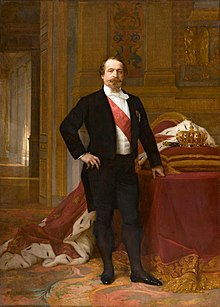
Back Napoleon III van Frankryk AF Napoléon III. ALS ናፖሌኦን 3ኛ AM Napoleon III Francena Cāsere ANG نابليون الثالث Arabic نابوليون التالت ARZ Napoleón III Bonaparte AST III Napoleon AZ اۆچونجو ناپلئون AZB Напалеон III BE
| Napoleon III | |||||
|---|---|---|---|---|---|
 State portrait of Napoleon III. This was Empress Eugénie's favourite portrait, since it represented, in her opinion, his person most faithfully (by Alexandre Cabanel, c. 1865)[1] | |||||
| Emperor of the French | |||||
| Reign | 2 December 1852 – 4 September 1870 | ||||
| Predecessor | Himself (as President of France) | ||||
| Successor | Adolphe Thiers (as President of France) | ||||
| Cabinet Chief | |||||
| President of France | |||||
| In office 20 December 1848 – 2 December 1852 | |||||
| Prime Minister | |||||
| Vice President | Henri Georges Boulay de la Meurthe | ||||
| Preceded by | Louis-Eugène Cavaignac (as Chief of the Executive Power) | ||||
| Succeeded by | Himself (as Emperor of the French) | ||||
| Head of the House of Bonaparte | |||||
| Tenure 25 July 1846 – 9 January 1873 | |||||
| Preceded by | Louis, Count of Saint-Leu | ||||
| Succeeded by | Louis-Napoléon, Prince Imperial | ||||
| Born | 20 April 1808 Paris, First French Empire | ||||
| Died | 9 January 1873 (aged 64) Chislehurst, Kent, England | ||||
| Burial | 1888 | ||||
| Spouse | |||||
| Issue | Louis-Napoléon, Prince Imperial | ||||
| |||||
| House | Bonaparte | ||||
| Father | Louis Bonaparte | ||||
| Mother | Hortense de Beauharnais | ||||
| Religion | Catholicism | ||||
| Signature | |||||
| Military career | |||||
| Allegiance | Second French Empire | ||||
| Service | French Armed Forces | ||||
| Years of service | 1859–1870 | ||||
| Rank | Commander-in-Chief of the French Armed Forces (1848–1870) | ||||
| Unit | |||||
| Battles / wars | |||||
Napoleon III (Charles-Louis Napoléon Bonaparte; 20 April 1808 – 9 January 1873) was President of France from 1848 to 1852 and then Emperor of the French from 1852 until his deposition in 1870. He was the first president, second emperor, and last monarch of France.
Prior to his reign, Napoleon III was known as Louis Napoleon Bonaparte. He was born in Paris as the son of Louis Bonaparte, King of Holland (r. 1806–1810), and Hortense de Beauharnais. Napoleon I was Louis Napoleon's paternal uncle, and one of his cousins was the disputed Napoleon II. It would only be two months following his birth that he, in accordance to Napoleon I's dynastic naming policy, would be bestowed the name of Charles-Louis Napoleon,[2] however, shortly after, Charles was very quick to be removed from his name. Louis Napoleon Bonaparte was the first and only president of the French Second Republic, elected in 1848. He seized power by force in 1851 when he could not constitutionally be re-elected. He later proclaimed himself Emperor of the French and founded the Second Empire, reigning until the defeat of the French Army and his capture by Prussia and its allies at the Battle of Sedan in 1870.
Napoleon III was a popular monarch who oversaw the modernization of the French economy and filled Paris with new boulevards and parks. He expanded the French colonial empire, made the French merchant navy the second largest in the world, and personally engaged in two wars. Maintaining leadership for 22 years, he was the longest-reigning French head of state since the fall of the Ancien Régime, although his reign would ultimately end upon his surrender to Otto von Bismarck and Wilhelm I on 2 September 1870.
Napoleon III commissioned a grand reconstruction of Paris carried out by prefect of the Seine, Georges-Eugène Haussmann. He expanded and consolidated the railway system throughout the nation and modernized the banking system. Napoleon promoted the building of the Suez Canal and established modern agriculture, which ended famines in France and made the country an agricultural exporter. He negotiated the 1860 Cobden–Chevalier Free Trade Agreement with Britain and similar agreements with France's other European trading partners. Social reforms included giving French workers the right to strike, the right to organize, and the right for women to be admitted to a French university.
In foreign policy, Napoleon III aimed to reassert French influence in Europe and around the world. In Europe, he allied with Britain and defeated Russia in the Crimean War (1853–1856). His regime assisted Italian unification by defeating the Austrian Empire in the Second Italian War of Independence and later annexed Savoy and Nice through the Treaty of Turin as its deferred reward. At the same time, his forces defended the Papal States against annexation by Italy. He was also favourable towards the 1859 union of the Danubian Principalities, which resulted in the establishment of the United Principalities of Moldavia and Wallachia. Napoleon doubled the area of the French colonial empire with expansions in Asia, the Pacific, and Africa. On the other hand, the intervention in Mexico, which aimed to create a Second Mexican Empire under French protection, ended in total failure.
From 1866, Napoleon had to face the mounting power of Prussia as its minister president Otto von Bismarck sought German unification under Prussian leadership. In July 1870, Napoleon reluctantly declared war on Prussia after pressure from the general public. The French Army was rapidly defeated, and Napoleon was captured at Sedan. He was swiftly dethroned and the Third Republic was proclaimed in Paris. After he was released from German custody, he went into exile in Great Britain, where he died in 1873.
- ^ "L'Empereur [Napoléon III]".
- ^ Strauss-Schom 2018, pp. 1–2.